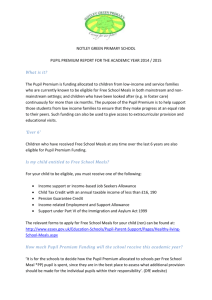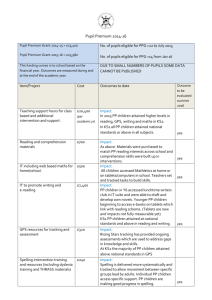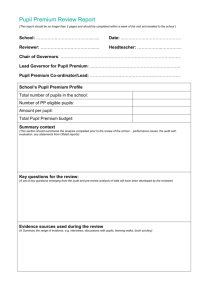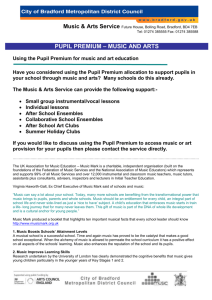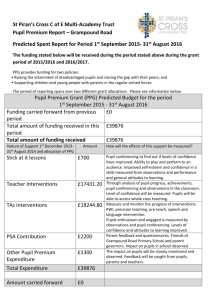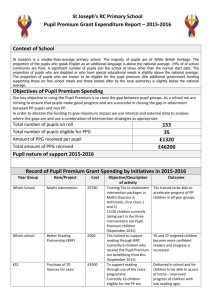NOTLEY GREEN PRIMARY SCHOOL PUPIL PREMIUM REPORT
advertisement
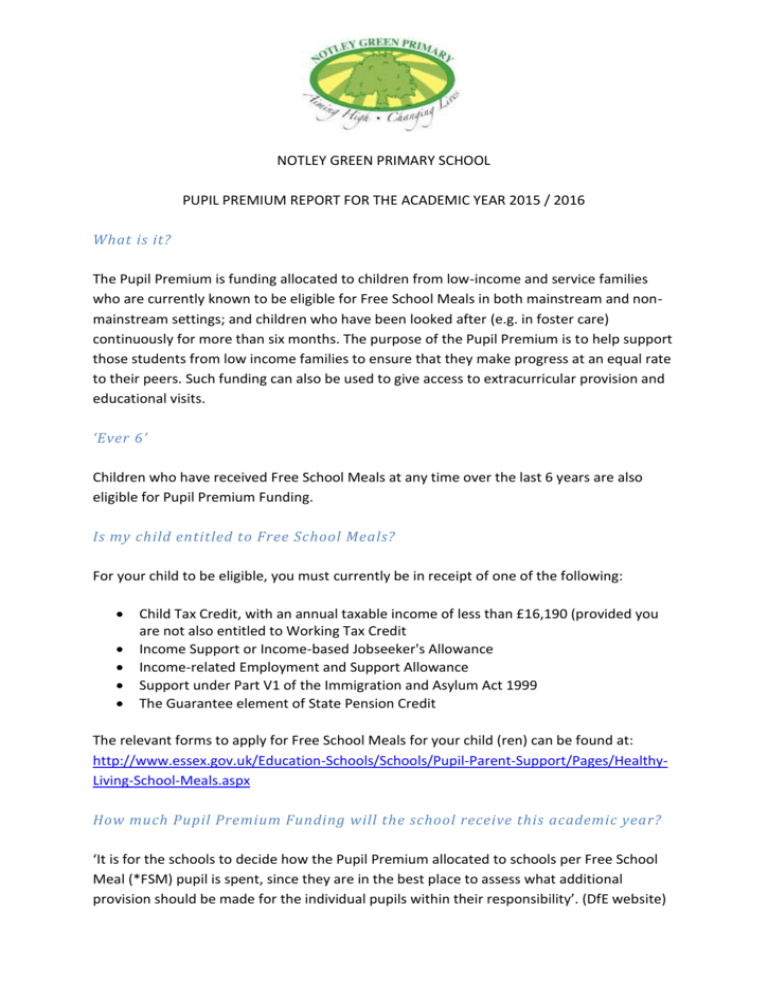
NOTLEY GREEN PRIMARY SCHOOL PUPIL PREMIUM REPORT FOR THE ACADEMIC YEAR 2015 / 2016 What is it? The Pupil Premium is funding allocated to children from low-income and service families who are currently known to be eligible for Free School Meals in both mainstream and nonmainstream settings; and children who have been looked after (e.g. in foster care) continuously for more than six months. The purpose of the Pupil Premium is to help support those students from low income families to ensure that they make progress at an equal rate to their peers. Such funding can also be used to give access to extracurricular provision and educational visits. ‘Ever 6’ Children who have received Free School Meals at any time over the last 6 years are also eligible for Pupil Premium Funding. Is my child entitled to Free School Meals? For your child to be eligible, you must currently be in receipt of one of the following: Child Tax Credit, with an annual taxable income of less than £16,190 (provided you are not also entitled to Working Tax Credit Income Support or Income-based Jobseeker's Allowance Income-related Employment and Support Allowance Support under Part V1 of the Immigration and Asylum Act 1999 The Guarantee element of State Pension Credit The relevant forms to apply for Free School Meals for your child (ren) can be found at: http://www.essex.gov.uk/Education-Schools/Schools/Pupil-Parent-Support/Pages/HealthyLiving-School-Meals.aspx How much Pupil Premium Funding will the school receive this academic year? ‘It is for the schools to decide how the Pupil Premium allocated to schools per Free School Meal (*FSM) pupil is spent, since they are in the best place to assess what additional provision should be made for the individual pupils within their responsibility’. (DfE website) The school is expecting to receive £1320 per eligible child from April 2015 – April 2016. There is additional funding if children are adopted, in care or are children of service families. Therefore the allocated Pupil Premium Funding is £118,040 which is based on 87 children. In addition the sum of £44,000 has been carried forward from the previous year, giving us a total of £162,040 for the year 2015/6. Planned Spending for the 2015 / 2016 of the Pupil Premium Grant and the expected impact is as follows: Project / Activity Well-being support Pastoral Care Manager – counselling, behaviour support, family liaison, attendance / punctuality Social groups Learning mentor – social support, learning support, play therapy Pet Assisted Wellbeing Therapy rooms Amount 60,000 Expected Impact Pupils learn how to selfmanage their learning behaviour Pupils gain life skills Pupils have strategies to manage their feelings Actual impact (to be advised at the end of the academic year) Project / Activity Targeted support 46,000 Tailoring each intervention to suit each child Matching skills of staff to needs Speech and language Use of high quality IT hardware and software Enriching the curriculum Amount Expected Impact 20,000 Free places given to after school enrichment clubs Funding for educational visits Visiting artist / educationalist for HA PP children Staff Training Regular training for Support Staff Regular staff training Courses attended by Senior Leadership Team re pupil premium Behaviour for learning – resilience / independence 16,000 Accelerated progress in reading Accelerated progress in writing Accelerated progress in maths Quick recall of times table facts Increased understanding of vocabulary in maths and application in writing Pupils have a rich bank of experiences to support ideas for writing Pupils are able to develop interests and talents outside of the school curriculum Pupils experience high quality teaching in a wide range of subjects Pupils have access to good quality books Pupils develop communication skills and confidence as speakers Staff understand barriers to learning and how to adapt strategies to support individual needs Funding is used effectively and is shown to have an impact Actual impact (to be advised at the end of the academic year) Project / Activity Steps training Extending School Support Amount 17,000 Subsidized Year 6 school journey Subsidized music support Free ‘Early Bird Learning Club’ places Free membership to Children’s University Parental Engagement Expected Impact 3,040 Parent workshops including reading and maths / internet safety crèche provided Free admission to FONGS events Tapestry for Year 1 Total available funding: Actual impact (to be advised at the end of the academic year) Pupils are healthy, are able to make good choices and understand the importance of maintaining health Pupils are introduced to new experiences and feel enabled to pursue them Parents are able to support their children at school Positive relationships are built and fostered within the school community 162,040 £118,040 + £44,000 Results from May 2015 [Data taken from RaiseOnline 2015] Percentage of pupils attaining or surpassing Level 4 and Level 5 in 2014 - 2015 in Key Stage 2 for Mathematics, Reading, Writing (TA) and English Grammar Punctuation and Spelling The cohort was 61 children with 25 (41%) children on the Pupil Premium (PP) register. We had no Children in Care 2014 – 2015. Three of the children on the PP register were on the SEN register at SEN support and two children had a Statement of Educational Need. One of these is now at a special school for his secondary provision and the other was funded under the medical category. Mathematics, Reading and Writing (TA) 68% (17 chn) of children eligible for PP attained L4 or higher in Mathematics, Reading (4B+) and Writing TA (4+). 4% (1 ch) of children eligible for PP attained L5 or higher in Mathematics, Reading and Writing TA. Reading 84% (21 chn) of children eligible for PP attained L4 or higher in Reading. 36% (9 chn) of children eligible for PP attained L5 in Reading. The group of children achieving L4 is 8% lower than their non PP counterparts, and for those attaining L5, they are 43% lower than their counterparts. ACTION: Support continues to be tailored to these children to increase their progression over the key stage. The highly able children will be challenged appropriately and booster groups will be available, including an Early Bird Learning Club. Writing (TA). 84% (21 chn) of children eligible for PP attained L4 or higher in Writing (TA). 12% (3 chn) of children eligible for PP attained L5 in Writing (TA). The group of children achieving L4 is 10% lower than their non PP counterparts and for those attaining L5, they are 44% lower than their counterparts. ACTION: Targeted children will be working in small groups to support their writing skills, focusing on composition and sentence structure. English Grammar Punctuation and Spelling 64% (16 chn) of children eligible for PP attained L4 or higher in English Grammar Punctuation and Spelling. 24% (6 chn) of children eligible for PP attained L5 in English Grammar Punctuation and Spelling. The group of children achieving L4 is 14% lower than their non PP counterparts and for those attaining L5, they are 32% lower than their counterparts. ACTION: English Grammar, Punctuation and Spelling training will be undertaken in the coming year to ensure high quality first teaching to support the learning of all groups. A new spelling resource will be purchased to ensure continuity of learning. Mathematics 84% (21 chn) of children eligible for PP attained L4 or higher in Mathematics. 32% (8 chn) of children eligible for PP attained L5 in Mathematics. The group of children achieving L4 is 14% lower than their non PP counterparts and for those attaining L5, they are 21% lower than their counterparts. ACTION: targeted children will be working in small groups to improve their maths skills and be challenged appropriately to their needs. Percentage of pupils who have improved by 2 or more levels in reading, writing and maths between key stage 1 and key stage 2 Reading 92% (22 chn) made at least expected progress in Key Stage 2. This is compared with 94% of their counterparts Writing 100% (24 chn) made at least expected progress in Key Stage 2. This is compared with 100% of their counterparts Mathematics 96% (23 chn) made at least expected progress in Key Stage 2. This is compared with 100% of their counterparts Attendance Attendance figures for the most recent full academic year (2014 – 2015) show that attendance by those children eligible for Pupil Premium is 94.21%.


